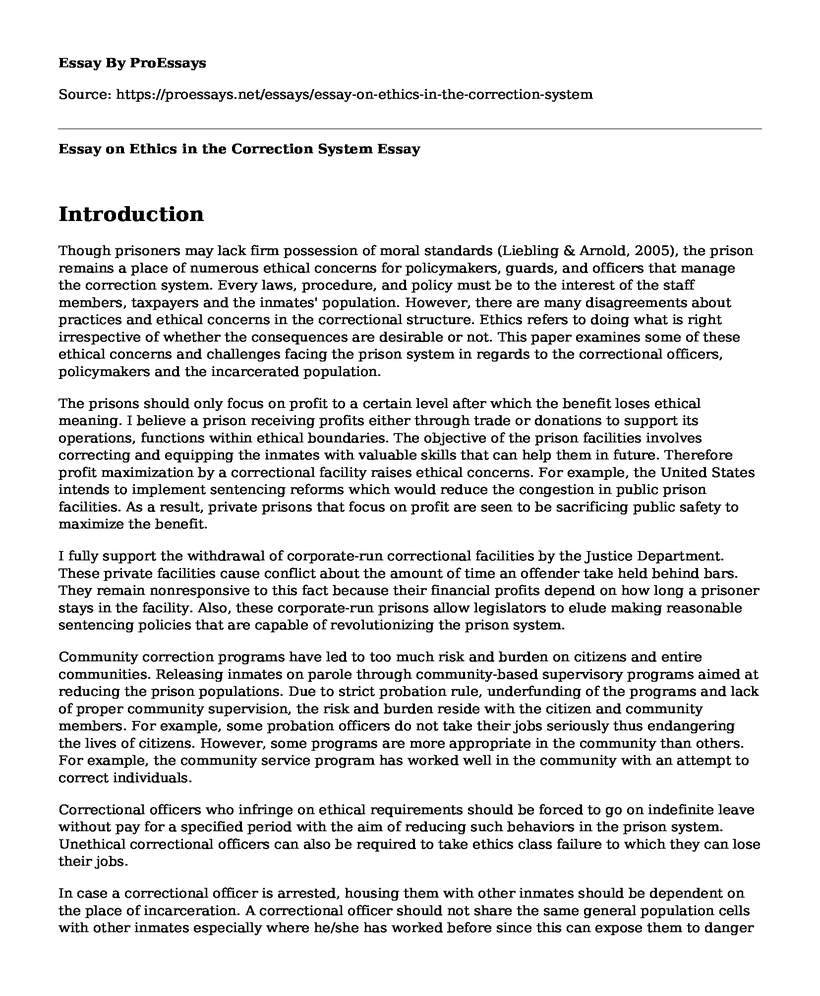Introduction
Though prisoners may lack firm possession of moral standards (Liebling & Arnold, 2005), the prison remains a place of numerous ethical concerns for policymakers, guards, and officers that manage the correction system. Every laws, procedure, and policy must be to the interest of the staff members, taxpayers and the inmates' population. However, there are many disagreements about practices and ethical concerns in the correctional structure. Ethics refers to doing what is right irrespective of whether the consequences are desirable or not. This paper examines some of these ethical concerns and challenges facing the prison system in regards to the correctional officers, policymakers and the incarcerated population.
The prisons should only focus on profit to a certain level after which the benefit loses ethical meaning. I believe a prison receiving profits either through trade or donations to support its operations, functions within ethical boundaries. The objective of the prison facilities involves correcting and equipping the inmates with valuable skills that can help them in future. Therefore profit maximization by a correctional facility raises ethical concerns. For example, the United States intends to implement sentencing reforms which would reduce the congestion in public prison facilities. As a result, private prisons that focus on profit are seen to be sacrificing public safety to maximize the benefit.
I fully support the withdrawal of corporate-run correctional facilities by the Justice Department. These private facilities cause conflict about the amount of time an offender take held behind bars. They remain nonresponsive to this fact because their financial profits depend on how long a prisoner stays in the facility. Also, these corporate-run prisons allow legislators to elude making reasonable sentencing policies that are capable of revolutionizing the prison system.
Community correction programs have led to too much risk and burden on citizens and entire communities. Releasing inmates on parole through community-based supervisory programs aimed at reducing the prison populations. Due to strict probation rule, underfunding of the programs and lack of proper community supervision, the risk and burden reside with the citizen and community members. For example, some probation officers do not take their jobs seriously thus endangering the lives of citizens. However, some programs are more appropriate in the community than others. For example, the community service program has worked well in the community with an attempt to correct individuals.
Correctional officers who infringe on ethical requirements should be forced to go on indefinite leave without pay for a specified period with the aim of reducing such behaviors in the prison system. Unethical correctional officers can also be required to take ethics class failure to which they can lose their jobs.
In case a correctional officer is arrested, housing them with other inmates should be dependent on the place of incarceration. A correctional officer should not share the same general population cells with other inmates especially where he/she has worked before since this can expose them to danger (Liebling & Arnold, 2005). However, they should be held in the same cell with other inmates in a different prison facilities.
Conclusion
Lastly, under no circumstance should the physical punishment be administered to prisoners. Physical punishment is a violation of human rights. Besides, many research studies show that physical punishment does not always fulfill the objective of correction in individuals but rather increase a violent behavior (Ward & Salmon, 2014). The constitution also does not provide circumstances under which physical punishment should replace other forms of punishment.
References
Ward, T., & Salmon, K. (2014). The ethics of punishment: Correctional practice implications. Aggression and Violent Behavior, 14(4), 239-247.
Liebling, A., & Arnold, H. (2005). Prisons and their moral performance: A study of values, quality, and prison life.
Cite this page
Essay on Ethics in the Correction System. (2022, Jun 05). Retrieved from https://proessays.net/essays/essay-on-ethics-in-the-correction-system
If you are the original author of this essay and no longer wish to have it published on the ProEssays website, please click below to request its removal:
- Childhood Trauma and Criminal Behavior: An Annotated Bibliography
- A Response to Three Texts on the Civil Rights Movements
- Criminal Justice and the American Bill of Rights Paper Example
- Research Paper on Aaron Burr's Role in Passing 12th Amendment to US Constitution
- Olympe de Gouges and the Emergence of a New Sense of Self - Research Paper
- Essay Example on 2003 US Foreign Policy: Iraq & Beyond
- Essay Example on Organizational Data Breach: Prevention and Control







